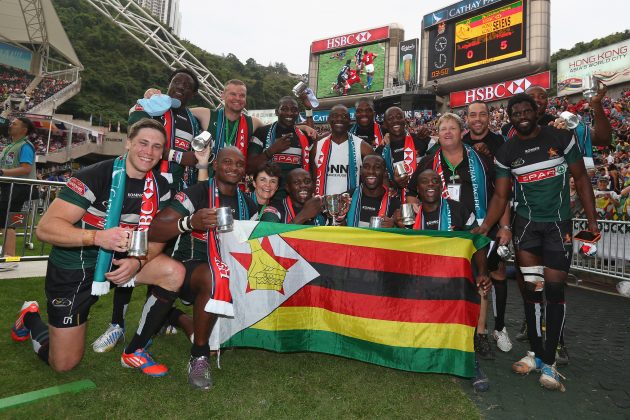Zimbabwe international Tafadzwa Chitokwindo has experienced the good and bad of living as a full-time player in Germany. He talks to Alan Dymock about his life in Europe as part of our Great Migration series
When you make your living as a rugby player, sometimes there are hardships to go alongside the wage you get for playing a sport you love. This can be particularly true for those who have moved a significant distance from home in order to do so. That much becomes apparent in talking to a mostly chirpy Tafadzwa Chitokwindo.
The Zimbabwean is quick. In fact, he’s very quick. It’s one of the reasons why German side TV Pforzheim agreed to give him a trial – they had seen his wheels in action during the 2013 Sevens World Cup. And after three months, Chitokwindo had done enough to be invited back on a full-time basis. The money he earns in central Europe has afforded him a lifestyle he could only fleetingly enjoy back in Zimbabwe, but there is also a harshness that comes with that.
Asked if he would stay in Germany long-term, Chitokwindo sighs before he says: “That’s a very tricky question because Germany is not the friendliest of places to be, social-wise. So in as much as everything is okay financially, the social side is a bit of a low. It’s a 50-50. I could go home but I know there are not many opportunities for me to explore, but I know my social life is going to be better and I’m always going to be happy. Here there are things like racism, people don’t appreciate you because they don’t want you here.”
How bad has the racism been for you in the country? “Now I think they’re getting used to us, because of all the refugees coming through. But just when I first came through, if I’d gone into a shop a security guard would follow me around. If I did anything, everybody would be watching me. So you endure the pressure, but then you know why you are here. There are always challenges to every new adventure. You just have to dig deep and move forward.”

Making the tackle: Chitokwindo (L) makes a tackle against South Africa
This sounds like a harsh low away from rugby, to go along with the financial highs and true enjoyment on the field. Germans have a complicated relationship with incomers and although he is not a refugee, you can understand how the African athlete may feel isolated in a country where a constant national discussion revolves around the vast intake of displaced foreign nationals.
SEE OUR INVESTIGATION IN THE NEW ISSUE
Chitokwindo studied in South Africa’s Rhodes University, but after moving back to Zimbabwe a job he took “moved sideways” nine months later and he looked elsewhere. He laughs about the fact it was rugby that took him to Europe.
Explaining the differences in lifestyle in greater detail, he says: “Back home I wouldn’t get anything out of rugby, I’d just play for the sake of playing. But coming here to Germany, I feel like I’m more independent because if I play I get my money and if I get my money then I can choose whatever I want to do with it. That’s the greater part of it.
“Coming from Zimbabwe, the greatest disadvantage is our passport. It’s one of the worst passports you can ever have. Having to apply for a visa is becoming a nightmare. You can’t really get a sports visa because most of the clubs are not willing to pay the minimum average (cost) for you to get one. You end up having to apply for a study visa or get a job so you get a visa for wherever you want to go. But at the same time you want to advance your rugby.

On the rise: German rugby – “especially sevens” – is climbing, says Chitokwindo
“Life away from rugby comes back to what you have in the wallet or how much you spend. If I was at home I wouldn’t be out and about or going around the world seeing other places. There is no money to do that and no time to do that as well. Coming to Germany I feel I can travel if I want to travel, play social rugby if I want to play social rugby, I can study. As soon as I got here I was told there was free tuition at university so that’s one thing I’ve taken up and I want to further my studies.
“Once you get into Europe, all these things open up. If you want to work, you can work. If you want to get into university, you can get into university. And things seem to run smoothly.”
FOR THE LATEST SUBSCRIPTION OFFERS, CLICK HERE
The rugby runs more smoothly too. At Rhodes, the uni team was also a club and he was able to continue playing for his national side when he was with them. But Chitokwindo explains the inherent issues with the club game in his home nation. He lays it out: “In Zimbabwe sometimes we have a league competition, sometimes not, because of funding. That was one huge step I had to get used to here – to play games week in, week out. In Zimbabwe sometimes you’d be told there were no games because of funding. Coming here everything was well organised, everything was well funded, and even going to an amateur union everything was a bit professional.”
He sees the game in Germany evolving and improving. He also feels that operating in a more professional set-up has meant he can bring more with him when he heads into national camps. With what he is going through in Germany, Chitokwindo feels he is becoming not only a better rugby player but a better person.






